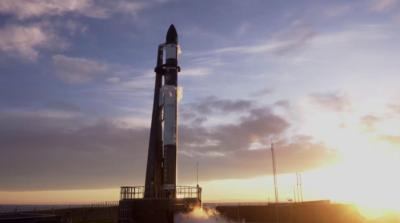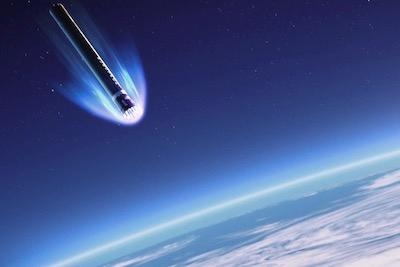Sat, Oct 23, 2021
Competes with SpaceX Multiuse Falcon
Rocket Lab has revealed its newest efforts refining its Electron rocket’s first stage recovery and reusability processes, during their next satellite delivery launch. After delivery of the second stage and payload towards its target, the first stage will complete a controlled descent, aided by parachutes, to a splashdown point in the ocean. On

ce there, their Ocean Recovery and Capture Apparatus (ORCA) system will retrieve the rocket and store it in its cradle for inspection and return to service. Their eventual goal is to capture a returning rocket mid-flight during its descent.
During the next launch, referred to as the “Love At First Insight” mission, Rocket Lab will deliver two Earth-observation satellites for global monitoring company BlackSky, sometime after November 11. The continued refinement of the Electron system is hoped to create a more robust, reusable, and reliable rocket with lower maintenance requirements after each successful mission. Changes to their operations will include closer chase helicopters to scout the touchdown point and begin recovery faster, with the rocket receiving improved heat shielding and a higher-deploying parachute system to provide a slower, longer descent. The data received will be analyzed for future aerial recovery efforts.

“As one of only two companies to recover an orbital-class booster from space, we’ve proven it’s possible to make Electron the world’s first orbital-class reusable small launch vehicle,” said Peter Beck, Rocket Lab founder and CEO. “We’ve perfected Electron’s controlled descent, demonstrated flawless parachute deployment, and successfully plucked stages from the ocean. Now we’re gearing up for the next stage – preparing to use a helicopter to catch a rocket as it descends to Earth from space. It’s ambitious, but with each recovery mission we’ve iterated and refined the hardware and processes to make the impossible ordinary. I’m excited to take what we learn from this launch and put it into practice with aerial capture missions in future.”
More News
Outboard Section Of The Right Wing And The Right Flap Separated In Flight And The Airplane Impacted A Farm Field Analysis: The pilot was approaching his destination airport under i>[...]
Final Approach Fix The fix from which the final approach (IFR) to an airport is executed and which identifies the beginning of the final approach segment. It is designated on Gover>[...]
"Our choice of when to respond, how to respond and on which targets to respond is a consideration that we make every time... Netanyahu also noted that anyone attacking Israel &ldqu>[...]
Estimated (EST) When used in NOTAMs “EST” is a contraction that is used by the issuing authority only when the condition is expected to return to service prior to the e>[...]
Aero Linx: Coalition of Airline Pilots Associations (CAPA) The Coalition of Airline Pilots Associations (CAPA) is the world’s largest pilot trade association representing ove>[...]
 NTSB Final Report: Cessna 177B
NTSB Final Report: Cessna 177B ANN's Daily Aero-Term (05.08.25): Final Approach Fix
ANN's Daily Aero-Term (05.08.25): Final Approach Fix Aero-News: Quote of the Day (05.08.25)
Aero-News: Quote of the Day (05.08.25) ANN's Daily Aero-Term (05.09.25): Estimated (EST)
ANN's Daily Aero-Term (05.09.25): Estimated (EST) ANN's Daily Aero-Linx (05.09.25)
ANN's Daily Aero-Linx (05.09.25)




